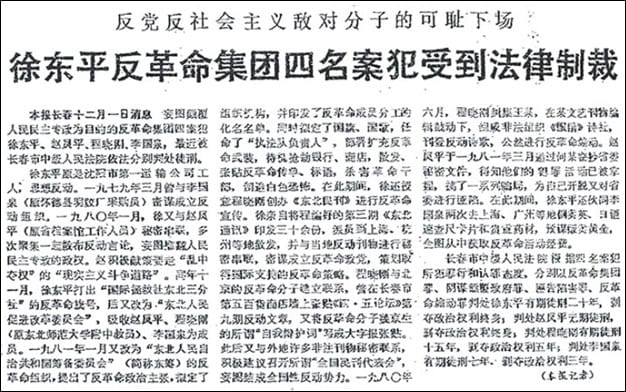<< Read all John Kamm Remembers stories
This post was originally published as part of the Roots series in the May 2015 Digest.

John Kamm was a private businessman based in Hong Kong when he was granted a meeting with Vice Minister of Justice Jin Jian and Prison Administration Bureau Director Wang Mingdi in April 1992. At the time, US Congress was debating whether to extend Most-Favored-Nation tariffs to China, and Kamm was one of the principal proponents in favor of granting China this treatment. The Chinese government decided to support Kamm’s effort by releasing information on cases and granting clemency to prisoners Kamm named in meetings and lists.
During the April meeting, Vice Minister Jin offered to respond to any prisoner inquiry Kamm submitted, provided that the name was given in accurate pinyin or, even better, in Chinese characters. Kamm immediately asked about Wei Jingsheng, arguably China’s most famous political prisoner known for his essays in support of democratic reform published during the brief period of political liberalization of the late 1970s. True to the vice minister’s word, Director Wang Mingdi responded to Kamm’s inquiry. Information included in the response was published the next day in The New York Times, which referred to the correspondence as “the first time that the [Chinese] government has provided extensive details of the imprisonment of Mr. Wei.”
Two years later, Kamm was compelled to look into a lesser-known case. In February 1994, Human Rights Watch published Detained in China and Tibet: A Directory of Political Prisoners. The 632-page tome contains information on approximately 1,700 prisoners and remains a valuable resource for scholars and activists.
Buried in the section “Long-Term Prisoners Sentenced Prior to 1989” was an account of a counterrevolutionary party, the Preparatory Committee for the Northeast China Autonomous People’s Republic, set up in Jilin Province in the early 1980s. The account was based on the transcript of a Changchun Radio broadcast recorded by the BBC. It gave the names of the three ringleaders—Cheng Xiaogang, Shi Dongting, and Zhao Fengxing—thought to remain in prison.
Kamm wondered whether the names were recorded correctly and if a written account of the case could be found in a provincial newspaper. On a hunch, he visited a Hong Kong library and searched Jilin newspapers published in late 1983. After several hours, he came across a detailed account of the case in the December 2 edition of the Jilin Daily that named the party leaders as Cheng Xiaogang, Xu Dongping, and Zhao Fengping.
Armed with Chinese characters and accurate pinyin, Kamm immediately filed an inquiry with the Ministry of Justice. In response, the ministry advised Kamm that all three men had been convicted of counterrevolutionary crimes. Cheng Xiaogang was sentenced to 15 years in prison and paroled on December 1, 1987. Xu Dongping was sentenced to 20 years in prison and released on medical parole in 1991. Zhao Fengping was given a life sentence, which was commuted to 13 years on December 20, 1989. Zhao’s sentence was due to expire on December 19, 2002. Kamm continued to inquire about Zhao after founding Dui Hua—until the ministry reported that he had been released two and a half years early on April 21, 2000.
The prospect of finding the names of political prisoners in open source materials seemed absurd until John Kamm went to a library in 1994. Five years later, Kamm would establish Dui Hua, which, due in part to the contribution of open-source research, now maintains the world’s largest database of Chinese prisoners of conscience.
Listen to the Encounters with China podcast.
Subscribe to receive notifications about new episodes.
Read all John Kamm Remembers stories.
